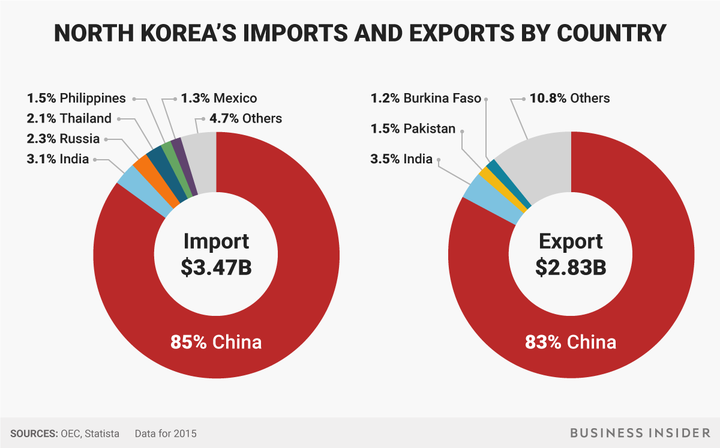China has historically been North Korea’s biggest trading partner – and it’s not even close.
Business Insider put together two charts comparing North Korea’s imports and exports by country using 2015 data from the Observatory of Economic Complexity (OEC), a project conducted at the MIT Media Lab Macro Connections group.
In 2015, 85% of imports came from China, according to the OEC. The isolated nation’s next biggest trade partner was India, from which North Korea got 3.5% of its total imports.
As for exports, 83% of North Korea’s exports went to China. India, meanwhile, got just 3.5% of its exports.
The centrality of trade with China to North Korea's economy is especially salient given the recent rise in tensions following North Korea's missile and nuclear tests in recent months.
Last week, the United Nations Security Council unanimously passed a US-drafted resolution to levy new economic sanctions on North Korea. The resolution intends to cap North Korea's oil imports, ban textile exports, end additional overseas laborer contracts, suppress smuggling efforts, stop joint ventures with other nations, and sanction designated North Korea government entities, according to CNN.
China also previously announced a ban on imports of iron ore, iron, lead, coal, and seafood from North Korea.
Much attention has been paid to the commercial ties between China and North Korea in recent months. Some have argued that the North Korean crisis can be "solved" if China applies economic pressure on the isolated regime.
In the 2016 US-Korea Yearbook published by the US-Korea Institute of the School of Advanced International Studies (SAIS) in the 2016 spring semester (and so, coming before the most recent round of sanctions), Han May Chan, then a second-year student, briefly explained the argument why the success of economic sanctions might depend on China's participation. Decades of sanctions have left other world powers with less sway over North Korea:
"Kwon contented that the benefit of changing the target country's behavior by implementing strong enforcement of the sanctions comes at a cost of weakening its political influence over the target country over time. Indeed, with the exception of China, the United States and the UN member states have incurred increasing costs of reducing their own political influence over North Korea.
[...T]he DPRK has grown accustomed to the hostile sanctions regime for decades. Therefore, the effectiveness and the success of the current sanctions regime actually depends solely on China and North Korea. Unless the DPRK believes that the benefits from trade with the international community are greater than the current security benefits of prioritizing its military-first economy, North Korea will have little incentive to change its policy."
Others, however, have questioned whether a strong response from China - and China joining North Korea's adversaries - could lead to the conclusion desired by the US and the UN.
"The last thing you would do in [North Korea's] situation is give up your independent nuclear capability," Jeffrey Lewis, who directs an East Asia program at the Middlebury Institute for International Studies, told the New York Times. "The one thing you hold that they have no control over. You would never give that up in that situation."

